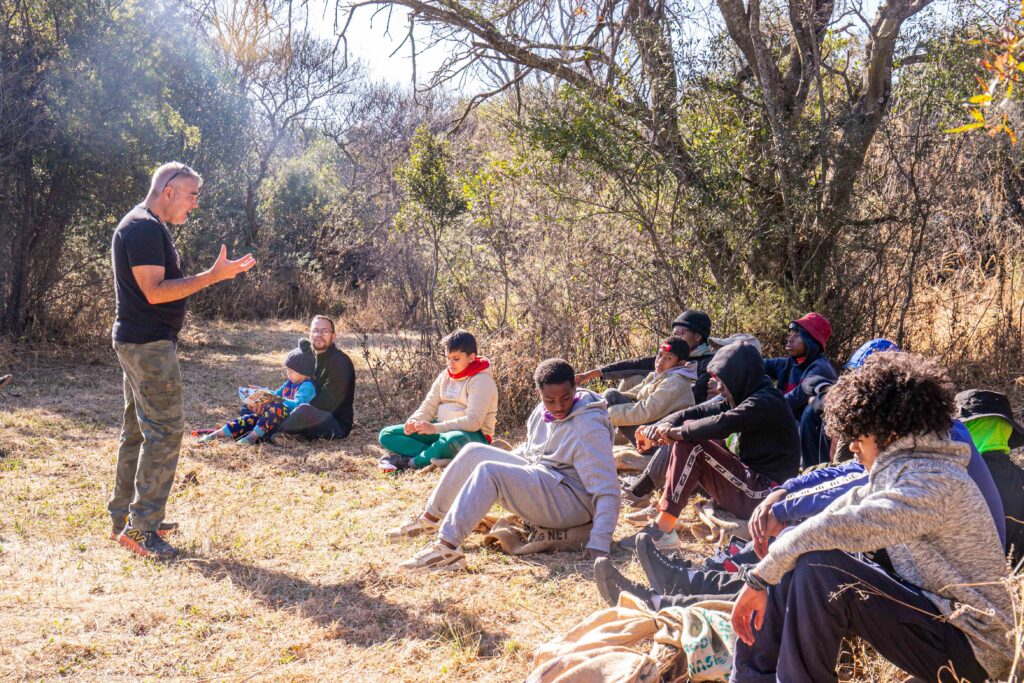
Across South African cultures, boys are still being taught that the right way to be a boy is to suppress emotions like sadness and fear, mask their pain and grapple with life’s challenges all by themselves. This is integral to the traditional ideology of masculinity which regards demonstrations of stoic silence, dominance, intimidation and aggression as “strength”. By contrast, boys displaying qualities such as empathy, kindness and collaboration are seen as showing weaknesses that are only acceptable in girls and women.
Masculinity misunderstood
There’s a major difference between inner strength and emotional repression. Outdated messages stemming from traditional masculinity, and modern ‘alpha male’ mantras from popular manosphere influencers hurt boys and those around them.
There’s a major difference between inner strength and emotional repression. Outdated messages stemming from traditional masculinity, and modern ‘alpha male’ mantras from popular manosphere influencers hurt boys and those around them.
Jaco van Schalkwyk, Founder of The Character Company, a non-profit organisation working with boys with absent fathers says, “The expectations of boys to ‘toughen up’, even when they are very small, takes a heavy toll on boys and men. Suppressing normal emotions can ignite lifetime battles with mental health issues. It also causes the stunting of emotional intelligence that puts males at a lifelong disadvantage, especially in a world that is placing more and more value on emotional and social intelligences.”
When boys think that it is unacceptable for them to process emotions such as sadness or to talk about their stressors, they don’t seek help when they are feeling overwhelmed. Various studies show that there is a significant gender gap between mental health help-seeking. This enables a reality where manageable but untreated emotional distress can easily lead to full-blown, long term mental health disorders. In South Africa, males are 4 to 5 times more likely to die by suicide than women, and young men in the 15 to 24 age bracket are especially vulnerable suicide.
While the masculine ‘toughen up’ imperative can devastate individuals, there are implications for society too, such as the prevalence of Gender-based violence (GBV), and the high rates of crime and substance abuse amongst men.
Changing the boy code
Over the past 13 years, The Character Company has paired hundreds of ‘fatherless’ South African boys with volunteers (social fathers) to provide them with committed positive male role models. Through the programme they are rewriting the masculinity code by providing values, mentorship and safe spaces for boys. Weekly mentorship sessions, as well as frequent nature activities and yearly camps helps boys express, reflect, and cope in healthier ways.
Over the past 13 years, The Character Company has paired hundreds of ‘fatherless’ South African boys with volunteers (social fathers) to provide them with committed positive male role models. Through the programme they are rewriting the masculinity code by providing values, mentorship and safe spaces for boys. Weekly mentorship sessions, as well as frequent nature activities and yearly camps helps boys express, reflect, and cope in healthier ways.
Jaco says, “The legacy of traditional masculinity leaves us with a long-standing problem where there is a basic lack of capability to identify and deal with our emotions as boys and men. So many boys don’t have the words to express challenging emotions because there’s a lack of emotional literacy being passed down from men to boys over the generations.
“Without words and without safe spaces, we are seeing greater numbers of boys becoming socially withdrawn and isolated, disassociated from their personal relationships and instead more vulnerable to developing parasocial relationships with manosphere influencers. When it comes to real, durable strength, boys need to learn from a young age that the strength of our masculinity lies in our gentleness. It is what we use to harness our warrior spirit to be protectors and not abusers.”
What boys really need to hear
Parents, teachers, sports coaches and social fathers all need a new ‘boy script’. Here are some examples of the changes we need to make:
Parents, teachers, sports coaches and social fathers all need a new ‘boy script’. Here are some examples of the changes we need to make:
- Boys don’t cry – It’s okay to feel, and feeling hurt is normal
- Boys don’t get scared – Everyone feels scared sometimes, and It’s brave to talk about your feelings
- Men go it alone – Boys and men need good friends. We belong in community. It’s normal to sometimes need help and it is an act of courage and responsibility to find the help you need. Jaco adds, “We need to teach boys from a young age to surround themselves with positive male role models so that they have safe spaces to be vulnerable and accountable to their friends and mentors – a committed group that encourages and supports the best versions of themselves.”
- Men don’t talk about their feelings – Everyone needs to understand their emotions and learn how to regulate their emotions. You don’t have proper control over your emotions if you pretend they don’t exist. “There is a direct link between boys not being taught how to regulate their emotions and gender-based violence as a result of men not showing up to teach boys this crucial skill set,” says Jaco.
Raising boys to be emotionally literate, creating safe spaces for boys and changing our language when we talk to boys is essential to supporting their mental health. Jaco concludes, “We also need to see more South African men actually stepping up for our boys in crisis. It’s important to get involved, to speak out against the societal attitudes that are hurting boys, to actively create the safe spaces boys need and be positive role models for them.”
About The Author
![]()
Subscribe To Our Weekly Newsletter









